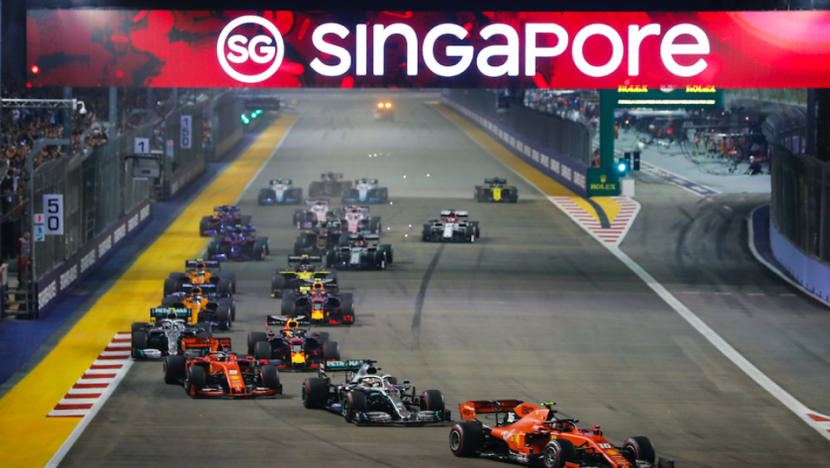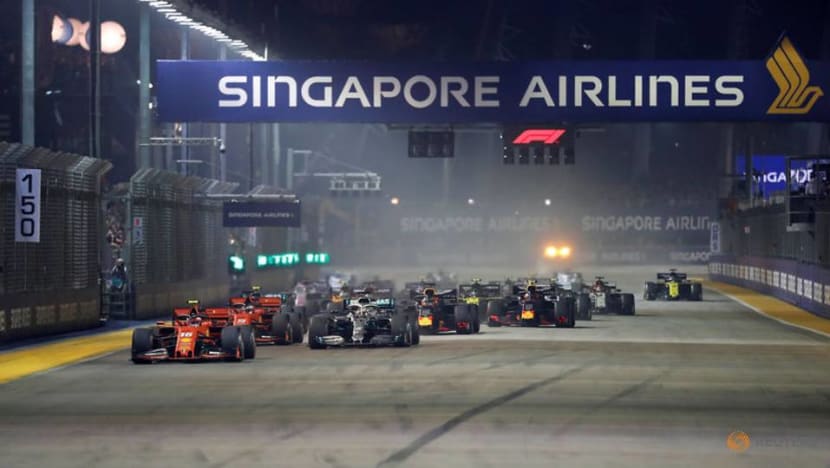commentary Commentary
Commentary: Singapore’s hosting of F1 Grand Prix – time to reconsider?
The F1’s elite stature appeals to a narrow fanbase, and benefits from hosting it seem to diminish the longer the race goes on, says John Duerden.

Formula 1 Singapore GP night race at the Marina Bay Street Circuit. (Photo: Singapore GP)
SINGAPORE: It’s been almost 15 years since Singapore first hosted the Formula One (F1) Grand Prix night race and what a ride it has been.
When Singapore hosted its inaugural race in 2008, the then deputy chairman and chief executive of the Singapore Tourism Board (STB) Lim Neo Chian was optimistic of meeting that huge target of S$100 million in tourism receipts over the three-day event.
“We’ve sold roughly 100,000 tickets...some 45,000 to 50,000 of that would be tourists,” Lim told media the weekend before the race started, adding that about 10,000 attendees are senior corporate executives.
READ: Commentary: The Australian Open has lessons for large sports events in Singapore
Indeed, this inaugural race in Singapore counted Lenovo’s then president and CEO William Amelio, Sony’s then chairman Howard Stringer and Royal Bank of Scotland’s then CEO Sir Fred Goodwin among its high-profile attendees.
No wonder then that Singapore wasn’t unfazed by the S$150 million to host the race with the government picking up 60 per cent of the tab.
SHOW ME THE MONEY
But it has not always been a smooth ride for host cities.
Melbourne, after hosting the race for 14 years, made a loss of A$41.3 million (S$42.46 million) in 2007.
Still, the city continued hosting the event. The visibility and tourist arrivals it delivered were intangible benefits sought by the state.
But others like Malaysia, the second Asian nation after Japan to host the F1 in 1999, realised it wasn’t worth it.
With attendances declining – hovering 80,000 in 2016 down from a high of 126,690 – and costs staying sky-high, Malaysia cancelled it a year later.
READ: Commentary: Tokyo Olympics will be a watered-down, subdued event if it continues
READ: Commentary: Here’s why Japan won't cancel the Olympic games even if it wants to
The sport has had a mixed record in trying to establish itself in Asia with races in South Korea and India lasting just four and three years in the 2010s.
Interest in the sport seems to be declining overall. In 2008, when Singapore hosted its first Grand Prix, there were 600 million global viewers, a figure that had fallen to a worrying 350 million in 2017.
There has been a slight recovery to 433 million by 2020 but the signs point to a waning interest in the sport.
DIMINISHING RETURNS
The STB said in 2017 that in its first decade, the race had brought about 450,000 international visitors and showcased the country to 780 million people around the world.
However, these returns seem to be diminishing the longer the race goes on.
READ: Commentary: The great pity behind the cancelling of the WEF meeting
The 11 races Singapore has hosted thus far is reported to have brought in S$1.4 billion in incremental tourism receipts – working out to around S$130 million a year, which is less than the amount Singapore spends to host the race.
In 2017, a deal until 2021 was signed which saw hosting costs reduced slightly from S$150 million a year to S$135 million.
HOSTING THIS YEAR IS INCONVENIENT
Singapore has managed to buck the Asian trend and establish itself as a major F1 destination for more than a decade.

But as the sport heads towards a crossroads in a turbulent COVID-19 world amid public health risks and an uncertain economy, it is timely now to examine its future in the country.
As Singapore currently grapples with a second wave of COVID-19 infections in the country, talk of hosting the F1 here can seem a little trivial and misplaced.
READ: Commentary: COVID-19 has relegated sports tourism from a slam dunk year to a no-show
This is especially as other major events such as the Singapore Open badminton tournament, the annual Shangri-la Dialogue and the prestigious World Economic Forum meetings scheduled to be held here have all been cancelled recently.
The spread of the pandemic is still a potent risk globally, so Singapore should be careful in opening its borders in a few months’ time for the F1 race – that is if tourists can travel here and are willing to do so.
The risk of incurring another wave of infections outweighs the economic benefits that any tourism receipts may bring, especially if it leads to subsequent lockdowns.
A WASTEFUL EXTRAVAGANCE?
But beyond the pandemic, with the F1 deal with Singapore up for renewal in 2021, Singapore should review its long-term value proposition.
Any benefits Singapore may accrue from hosting the event and showcasing the city state beyond the 11 years it has already done so is likely to be incremental.

Given the dismal global economic situation, some have pointed out the F1 is a wasteful extravagance.
James Walton, head of Deloitte South-east Asia's sports business group, told media in 2019 that any spending on F1 “may be seen as a luxury by the public” during a global financial slowdown.
That sentiment has grown stronger against the backdrop of muted economic growth, job losses and high unemployment across the world, F1 won’t sit well with too many people.
AT ODDS WITH SUSTAINABILITY AGENDA
Moreover, as Singapore joins many other countries to bring issues of sustainability and climate change to the fore of society’s consciousness, with a Green Plan to manage the country’s carbon footprint, hosting the F1 seems counter-productive to such efforts.
READ: Commentary: Lewis Hamilton has dominated F1. But the sport has also gained from his success
The F1’s track-record is far from impressive with total carbon emissions of over 256,000 tonnes in 2018 alone, with the logistics involved in organising races all around the world - transporting huge teams, equipment and cars - accounting for 45 per cent of the sport’s carbon emissions.
While F1’s plans to go carbon-neutral, mainly through developing the use of sustainable fuel, are laudable, even then, most of F1’s carbon footprint involves the logistics and transport.
There are few other games that consume this many resources just so teams and their expensive cars can jet around the world to race.
HOW MUCH DOES SINGAPORE NEED F1 TO BE ON WORLD RADAR?
Favourable tax and business climates have also attracted many of the world’s top business leaders to move here or at least set up family offices in Singapore. That is likely to have more direct influence and impact on Singapore’s economic growth.
Furthermore, since the first Singapore race in 2008, the country has diversified its economy further and brought big-name companies from China, the US and Europe to establish a key regional presence here.

While having the world’s elite congregate here for a weekend of networking does have its attendant benefits, surely Singapore, host to Bloomberg’s New Economy Forum and would-have-been host to the now cancelled World Economic Forum, does not need the F1 to put itself on the radar of the world’s elite anymore.
Home to some of the most recognisable bars and nightclubs in Asia like Regent Hotel’s Manhattan, Parkview Square’s Atlas and Jigger and Pony, that make the annual Asia’s 50 Best Bars, Singapore also arguably no longer needs the F1 race to enliven its image.
READ: Commentary: Even the Tour de France is going virtual
As the world uses the pandemic to reflect strategic priorities, Singapore should also reconsider on which side of the conversation it wants to be when the world recovers from COVID-19 and looks at F1’s place in the world.
2020 has been a challenging year for sports in general, but it may also be an inflection point for countries to reconsider hosting some of the more wasteful ones.
John Duerden has lived in Asia for 20 years and covers the region’s sporting scene. He is the author of three books including Lions & Tigers - The History of Football in Singapore and Malaysia (2017).
















